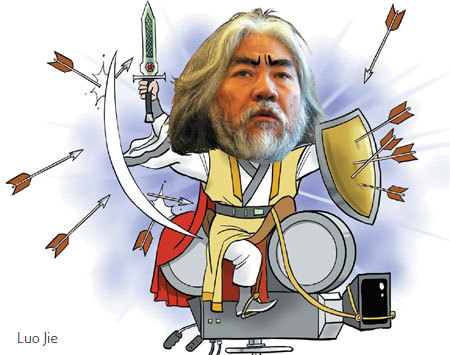
|
CHINA> Profiles
 |
|
Might is right
By Liu Wei (China Daily)
Updated: 2008-11-25 07:59 Nine years ago Hong Kong writer Louis Cha told a mainland newspaper that if State broadcaster CCTV treated a book of his as seriously as it had Romance of the Three Kingdoms (Sanguo Yanyi) and Outlaws of the Marsh (Shuihu) he would charge only 1 yuan for the rights.
 His comment happened to be read by Zhang Jizhong, who had produced the two TV series Cha mentioned. He faxed Cha a letter, saying if they could work something out, it would make headlines. Cha is the best-loved wuxia (martial arts and swordsman) novel writer of his time, boasting millions of readers in Chinese-speaking areas. Until 1999, though, no TV series or films of his work had been produced on the mainland. Cha faxed back the next day, giving Zhang permission to pick one of his 14 wuxia novels. Zhang bought a frame, carved some patterns on it, put in the 1 yuan note and duly handed it over. Cha was pleased by the gift, which paved the way for the pair to collaborate ever since. "Above everything else, I contacted Cha because his books are really good," Zhang says. "The 1 yuan was the second tempting reason." Zhang believes that wuxia books, especially Cha's, portray many aspects of traditional Chinese culture in an accessible and attractive way. "In Cha's works we find his thoughts on Confucianism, Buddhism and Taoism, the Chinese standards for a hero, as well as Chinese literature, arts and even cuisine," he says. "Among so many wuxia novels, it is Cha's that make it possible for common readers to relate to the heroes. All of them grow up in the grass roots of society and the stories, although fictional, are set in real historical backgrounds." Emperors, not laws, ruled China for much of its history so people in ancient times had to hope for some upright and generous martial artists to correct wrongdoings. Wuxia thus has been a perfect topic for works of fiction and enjoyed a 20-year golden age after the late-1950s, spearheaded by Cha. To Zhang's surprise, his first TV series adapted from Cha's works, The Smiling, Proud Wanderer (Xiao'ao Jianghu) was castigated on the Internet. Some fans were irritated by Zhang's changes to the original plot, while others thought the casting was poor. Zhang still remembers one comment: "Only the donkey did a good job", referring to a donkey carrying the lead actor in the first episode. The online onslaught did not, however, stop the show achieving an unprecedented 19 percent audience rating. "People loved the book so much they could not bear any differences between the actors and the characters in their imagination," Zhang says.
Another key reason for the harsh criticism, he says, was the broadcasting on the mainland of Hong Kong productions of Cha's works in the early 1980s. They left an impression with milllions of viewers but had portrayed the characters differently from Zhang. His wuxia career has flourished since The Smiling, Proud Wanderer. He has produced and directed six more TV series on Cha's books. Each show made headlines and drew a torrent of abuse but earned high ratings. His Demi-Gods and Semi-Devils (Tianlong Babu) earned an 8 percent rating in Taiwan, making it the island's top TV series in 2005. "I had no time to care about the criticism. I cared only about Cha's opinion," says Zhang. Not all was rosy between the two men, though. Cha was not happy about a change Zhang made to the storyline of The Smiling, Proud Wanderer. Moreover, Cha charged 620,000 yuan ($91,200) for the rights to their second collaboration and Zhang says the price kept going higher. "Cha is a very smart person with a sharp business mind," Zhang says. "His assistant often called me, asking me to inform them before a new show was to be broadcast, because every time my series was shown the books sold well. It is a win-win situation." The most difficult aspect of the wuxia series, he says, has not been the endless sniping but how to visually convey hundreds of types of martial arts, especially when so many previous programs had already exhausted every conceivable option. One such dilemma was how to choreograph Mei Chaofeng, a character in The Legend of the Condor Heroes (Shediao Yingxiongzhuan). Mei's kungfu was called Nine Yin White Bone Claw (Jiuyin Baigu Zhua), a fatal skill that kills people with 10 fingers and leaves 10 holes in the victim's head. Zhang was long troubled over how to create a scene worthy of such impressive skills and cast hundreds of actors before an assistant reminded him of established dancer Yang Liping. Yang made her name with her signature dance Spirit of Peacock, featuring exquisite hand movements imitating the peacock's head. Zhang described how he felt as if he was hit by lightning when he heard the suggestion - that's it! Yang's dazzling hand movements turned out to be one of the show's most remarkable scenes. Recently, Zhang had a similar problem creating a scene involving Universal Grand Shift (Qiankun Danuoyi), an ultimate martial art in Heaven Sword and Dragon Sabre (Yitian Tulongji), which he is producing. The book claims trans-locating forces from one direction to another would make the practitioner's face half red, half green. "Even when you ask Cha, he cannot answer what the skill looks like," he says. "You have to imagine yourself and create an innovative but feasible way to present it on screen." As long as TV and filmmakers can make good interpretations of wuxia culture, Zhang believes there will always be a demand for it. "People love stories about heroes all the time," he says. (China Daily 11/25/2008 page19) |